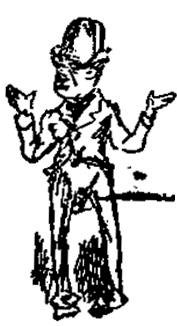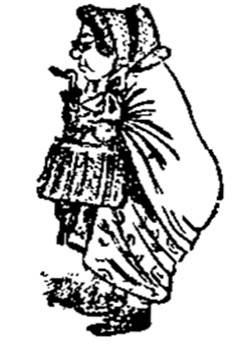This article has been transcribed from a copy of the Cardiff Times in the online collection of scanned Welsh newspapers 1804-1919 in the National Library of Wales, with grateful recognition of the free access accorded to all readers. Paragraph breaks have been introduced for easier reading.
Samuel’s language is less lively than in some of his earlier articles, with the result that this article resembles serious advice literature. He presents himself as having ‘risen in the world’ somewhat, since he now employs a cook, although his staff is not adequate for the sort of dinner he aspires to give, and he must employ a ‘waiter’ to help with the service. He has certainly become a snob, though he doesn’t appear to know it.David Skilton

The victim of an error
Apart, sir, from all snobbish consideration (I am sure, sir, that you could never accuse your Samuel of snobbery, for he is nothing if not affable; indeed, he is always ready to partake of a little refreshment with any decently respectable person rather than hurt the feelings of the latter by a refusal), it falls to most of us to have family connections which, if they are not positively disagreeable, are at least, in many cases, mightily inconvenient. It is said that every family cupboard has a skeleton in it (I certainly know plenty of cupboards that have lots of bones in them – and little else) – and this weird monster but too often takes the form of a somewhat substantial brother-in-law, who – quite inadvertently, and in a fit of pre-occupation, of course, – wrote somebody else's name instead of his own, and had to serve a long apprenticeship in the stone trade at Portland as a consequence; or it resolves itself into an uncle who thinks it his stern duty to put in at least nine annual appearances before the bench, after having drunk copious libations to nobody in particular – an uncle who does not disdain to borrow the wherewithal to make up a sufficient sum for a morning draught of stimulating medicine in the shape of a lotion – to be taken inwardly. This form of relation is by no means uncommon, and the chief favour he requests at your hands is that you will (and usually at midnight, too) ‘bail him out,’ which is rather an uncertain sort of demand, and may perchance mean that you shall engage the services of a medical man and a stomach pump.
People of this sort are the real family phantoms, and the best regulated family is seldom without them. Regarding mothers-in-law, sir, I had rather not speak at any length or with any strength – it might be warm for me if I did. The subject is too old a one, all the ‘funny’ men of the last few thousand years or so having had a go at it. Surely, sir, speaking in this regard, the original of our battered old friend Aunt Sally must have been a mother-in-law, and not an aunt; anyhow, Sally – (pardon the familiarity, Sarah) – typifies the average mother-in-law, for anyone can have a cheap shy at her. I have always noticed one thing, sir, about the rollicking blades who have so much to say about their long-suffering mothers-in-law, and that is that they invariably fail to mention the ‘small loans’ they have at various times floated with the latter. It is charged against mothers-in-law that they are ‘good stayers;’ in fact, that they'll stay on with their sons-in-law till they begin to believe that the homes of the latter are their own, but how often is it the case that the said son-in-law has developed some such amiable peculiarity as going to bed in his boots, or undressing on the hall mat, or insisting on haying the key of the spirit cupboard at 3 a.m., little marks of exuberance whose intensity the presence of the generality of mothers-in-law does much to counteract? Will you kindly tell your young men readers to adopt this plan, sir, if they never wish to marry at all, and yet desire to, in some degree, appreciate the fevers and chills, the hopes and fears, of courtship? Here is the scheme: – After the guileful youth has been duly accepted by some damsel, let him tell the mother of the latter that he will only marry on one condition, namely, that the said mother shall undertake not, on any pretext whatever, to visit the house. If a man have the hero-like courage, the stupendous effrontery, to do this, I warrant me that he will remain single – that is, unless he make a mistake, and chance upon a girl who hasn't got a mother. But I will leave mothers-in- law, seldom though they are said to leave other people.

‘Never tasted a drop; has a spite against me!’
I have myself plenty of ‘near’ relations – ‘close’ relations, sir, some of them so near that they might more fitly be described as niggardly. I have invited them to my house[,] fêted them, sir, but, I am sorry to say that when I have broached the subject of that little loan about which I have so frequently spoken to you, they have, though they seemed perfectly at ease only the moment before, suddenly pleaded an immediate and most important appointment with a person to whom, as they assured me, they owed a considerable sum of money. I found then that it was with them a case ‘thou art so “near” and yet so far.’ Now as to some other relations. Of course you know that undesirable family connection who is either in all verity a working man, or glories in dressing and looking the part, and in saying that he is. Miserable man that you are if you live in the same town with him. Possibly you ‘discover’ him in the same town, and though the kinsmanship be but distant, you invite him to dine with you on the following Sunday – then, woe betide you. Sunday after Sunday will he appear on the scene, and, supposing you are, possibly for diplomatic purpose, making a little bit of a ‘spread,’ as it is called, by giving a dinner party to a few people it is desirable to conciliate and to impress with a due sense of your importance, he will, though uninvited, turn up like the inevitable bad shilling and confound and undo you. If you aim at a sort of reputation, he will shock you by declaring before all your guests that he has dropped in ‘promiscuous like;’ that he should have called earlier if he hadn't had the ‘winders’ to clean for his wife; that anything will do for him, if it's nothing but cow-heel; that he's not ‘pertickler’ to a shade, and that he doesn't want to stop late, as he has a handcartful of chips to deliver next morning first thing.
Of course he is dight in a diabolical costume for an evening party, but he apologises for this by saying that if he had only known, he'd have ‘donned’ himself in his new check suit, which he picked up a dead bargain second-hand. And then what a high old time you have. He does sword swallowing feats with his knife; he eats hugely, and drinks ditto; he helps himself to salt with his fingers; and picks bones with the same agents – and his teeth; he tells the young lady opposite to him that he hopes she won't take a cold in her shoulder blades; he flatly contradicts the very man you most wish to cultivate; he recommends a remedy for corpulence to a stout lady, and suggests a means of acquiring flesh to a thin one; he calls the waiter a ‘fat head;’ he promises a comic song so soon as the adjournment to the drawing-room shall take place; he looks round at the glasses and the spread generally and says, ‘Eh, Sam, but it was not like this when thy father and mine used to 'liver milk on the same beat, an' had to cook their own bits of “kagmag,” [decayed meat] afore they took Aunt Maria out of the work’us.’ Should you commence a story which deals on family matters, he will contradict you at all points. You begin, for instance, ‘When my father was in the army,’ and he chimes in with, ‘No, it was the militia. I've seen his discharge many a time.’ And cruel indeed is his accuracy in contradictions of this sort. He is perhaps the commonest – in more senses than one – of all family bugbears.

Let me not forget the elderly female relative – a great aunt possibly – who frequently calls in about meal times. To this you would not so strongly object did she not subsequently, in some neighbourhood where you would desire to be thought well of, make the fact public, generally through the medium of other people's servants, that you are a ‘stuck-up lot,’ although you have ‘no call’ to be so, as neither your father nor mother was ‘anythink very big.’ She has a partiality for forming an intimate acquaintance with the cook, or one of the other servants, to whom she relates your whole pedigree, adding to the story many embellishments provided by herself. Little drops of gin are her weakness, and, being once provided with a comfortable potation, she will hypocritically wax eloquent in her praise of the superior beauties and merits of your off-spring. I must now speak of envious relations – envious poor relations of course. You invite two of them, say, to dine with you. They feast well – and then, as both are going in the same direction, they walk home together. Ordinarily they hate each other like poison, as you happen to know, for each one has abused the other to you personally, but, as they bend their steps from your domicile, they conclude a sort of temporary truce and alliance, and discuss you and your menage freely. Of course they both agree ab initio that they don't know how you ‘do it’ that you are a ‘greedy hunks,’ [misers] and that if either of them had had anything like the ‘luck’ that has befallen you, they would have done things in a very different style. It is more than probable that each of them will call and tell you in the deepest confidence what the other has said, quite omitting his own – the teller's – individual share in the matter.

‘Never does anything, my dear sir, without consulting me.’
A most undesirable relation is the man who is – if you happen to be a public man – eternally referring, wherever he may be, to the fact that you are a family connection of his. If you engage yourself in burning questions of the day, he will, though he has never seen you for months, tell what he alleges is your very private opinion regarding the same, and will, moreover, relate, with much apparent gratification, how you have frequently sought his guidance and advice in resolving your doubts. He never loses an opportunity of dragging your name into conversation, and thus you become to quite a host of people a veritable nuisance and bete noir. I suppose that I ought by rights to make something more than passing mention of the undesirable relation who is so fond of asking you to become surety for him; of the one who has the brokers in about every month; of the one who is for ever pestering you to become the godfather of one of his children; of the one with a large-small family, who dies bequeathing to you his interesting offspring; of the one who seems to think that you can command for him situations in every possible branch of life; of the one of the same name, who files his petition, and for whom you are mistaken; and of the one who comes with a pocketful of stones, and smashes all your windows because you refuse for the second time to purchase him a passage to Timbuctoo or somewhere or another; but the task is one, sir, from which your Samuel shrinks, for he has been the wretched victim of more than one of these classes, and the subject is full of such painful memories as would lacerate his tender bosom.
. Surely, sir, the adage, ‘Save us from our friends’ ought to be immediately changed into ‘Save us from our relations.’ It is so inconvenient, my dear sir, that one has so many relations who are in the slough, and so few that have piled up the merry little pieces – the shekels. But there is one good thing about one's rich relations, and that is that they so seldom trouble one. Would that all the others were like them.
Last modified 31 January 2022